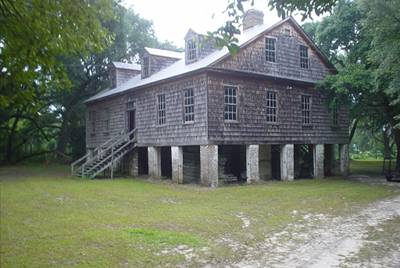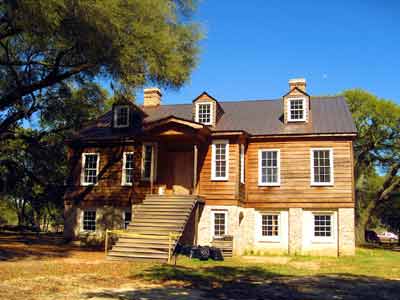Rosebank Plantation – Plantersville – Georgetown County

— Rosebank Plantation Prior to Restoration © R. Myers Truluck, Jr., 2005 —
(Do Not Use Without Written Consent)
Basic Information
- Location – Pee Dee River, Plantersville, Prince George Winyah Parish, Georgetown County
Original plantation lands were located off Plantersville Road between Chicora Wood Avenue and Exchange Drive.
- Origin of name – ?
- Other names – Ditchfield, Ditchford
- Current status – Part of Exchange Plantation
Timeline
- 1733 – Earliest known date of existence (1, p. 343)
Peter Allston received a grant for 300 acres on the Pee Dee River (1, p. 343).
- ? – Peter Allston's brother John Allston purchased the property from him (1, p. 343)
- 1750 – John Allston left the 300 acres plus additional neighboring property he had acquired to his son William Allston in his will (1, p. 343)
- 1761 – Thomas Waites purchased the property from William Allston (1, p. 343)
- 1762 – Thomas Waties' will stipulated his property was to be divided five ways among his wife and four surviving children (1, p. 349).
- ? – An undated plat recorded Levi and Moses Myers as owning the property formerly of "J. Waties" (1, p. 350).
- 1819 – Davison McDowell purchased the plantation from Moses Myers for $1,904.75 (1, p. 350).
- 1821 – Davison McDowell sold part of his plantation to Samuel Smith, who quickly sold the same piece of property to John Coachman. This tract become known as Rosebank Plantation (3, p. 343, 350).
- Circa 1820s – House built (1, p. 344)
It is believe the house was built during the ownership of John Coachman (1, p. 344).
- 1835 – John Coachman conveyed the plantation to his son James J. Coachman (1, p. 344).
- 1841 – James J. Coachman conveyed Rosebank Plantation to Francis Weston and Alexander Robertson as trustees for Margaret Jane Bentley Weston Fraser who was married to Hugh Fraser II (1, p. 344).
- 1851 – The Frasers sold the plantation and 51 slaves to Robert F. W. Allston who owned neighboring Chicora Wood Plantation. Allston continued to cultivate rice at Rosebank but preferred to call the plantation Ditchford (1, p. 344).
- 1864 – Robert F. W. Allston and much of his land was sold after the Civil War to pay debts of his estate (1, p. 346).
- 1865 – The house was vandalized (1, p. 346).
- 1870 – Margaret Weston Fraser, through her trustees, was able to purchase the plantation back from the Allston estate. She and her sons, Benjamin Porter Fraser and Paul Weston Fraser, along with their families, made their home at Rosebank (1, p. 346).
- 1930 – Benjamin became sole owner of the plantation after the deaths of his mother and brother. Although he moved in the 1920s, Benjamin retained ownership of the plantation until his death in 1930 at the age of 90. Benjamin left his estate to his nine children (1, p. 346).
- 1930s – During the depression, the Fraser children sold the plantation to a group of sportsmen (1, p. 346).
- 1945 – Thomas S. Ragsdale acquired the plantation and Rosebank became part of Exchange Plantation at this time (1, p. 346).
Land
Slaves
- Number of slaves – 16 in 1800; 67 in 1850 (1, p. 343-344)
References & Resources
- Suzanne Cameron Linder and Marta Leslie Thacker, Historical Atlas of the Rice Plantations of Georgetown County and the Santee River
(Columbia, SC: South Carolina Department of Archives and History, 2001), pp. 343-346
 Order Historical Atlas of the Rice Plantations of Georgetown County and the Santee River
Order Historical Atlas of the Rice Plantations of Georgetown County and the Santee River - Claude Henry Neuffer, editor, Names in South Carolina, Volume I through 30 (Columbia, SC: The State Printing Company)
 Order Names in South Carolina, Volumes I-XII, 1954-1965
Order Names in South Carolina, Volumes I-XII, 1954-1965
 Order Names in South Carolina, Index XIII-XVIII
Order Names in South Carolina, Index XIII-XVIII
- William P. Baldwin, Jr., Plantations of the Low Country; South Carolina, 1697-1865
(Greensboro, NC: Legacy Publications, 1987)
 Order Plantations of the Low Country; South Carolina, 1697-1865
Order Plantations of the Low Country; South Carolina, 1697-1865
- George C. Rogers, Jr., The History of Georgetown County, South Carolina
(Spartanburg, SC: Reprint Company, 1990)
 Order The History of Georgetown County, South Carolina
Order The History of Georgetown County, South Carolina



